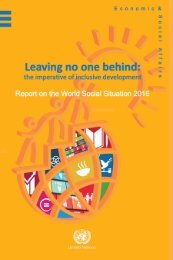Migrant Smuggling Data and Research
zgw9fv2
zgw9fv2
You also want an ePaper? Increase the reach of your titles
YUMPU automatically turns print PDFs into web optimized ePapers that Google loves.
What makes migrant smuggling more complicated in the region is that<br />
migrants in all three categories listed above may resort to the same human<br />
smugglers either for entry or exit from Turkey. Besides, the boundaries between<br />
these three categories are often very blurred. 24 The geographical limitation on<br />
the 1951 Geneva Convention on Refugees that Turkey withholds – that is, not<br />
allowing non-European asylum seekers who are accepted for refugee status<br />
to settle in Turkey permanently – has further direct implications in migrant<br />
smuggling, forcing some asylum seekers who have access to more resources<br />
opt for human smuggling. 25 Ironically, however, all asylum applications made<br />
in Turkey to the United Nations High Commissioner for Refugees (UNHCR) are<br />
from non-European countries, <strong>and</strong> those accepted as refugees instead wait for<br />
resettlement in a third country. 26<br />
In line with the response of the international community in combating<br />
migrant smuggling <strong>and</strong> trafficking, Turkey adopted two United Nations Palermo<br />
Protocols on 18 March 2003, thereby accepting the broader definitions of<br />
human smuggling <strong>and</strong> trafficking. For the first time, Turkish decision makers<br />
then introduced heavy penalties for the crimes committed. 27 Accordingly, in<br />
the Turkish context, two different categories fall under the field of smuggling:<br />
(a) migrant smuggling; <strong>and</strong> (b) human trafficking. These two notions are<br />
considered different crimes, since migrant smuggling is considered a crime against<br />
the nation-State, whereas human trafficking is a crime against an individual<br />
(International Centre for Migration Policy Development (ICMPD), 2015). When<br />
compared with the organized criminal networks of trafficking in persons, migrant<br />
smuggling networks in Turkey tend to be more r<strong>and</strong>omly organized with different<br />
people doing diverse jobs, very mobile <strong>and</strong> spontaneous, <strong>and</strong> yet exploitative.<br />
24<br />
For example, a transit migrant may apply for asylum after some time <strong>and</strong> stay in Turkey much longer while<br />
at the same time, work in Turkey without proper documentation. When a rejection notification is received,<br />
an asylum seeker in Turkey turns into an irregular migrant automatically – either face deportation or resort<br />
to human smuggling – <strong>and</strong> becomes another transit migrant. The blurred boundaries between the asylum<br />
system <strong>and</strong> transit migration is partly attributed to the asylum regime in Turkey <strong>and</strong> partly due to the<br />
increasing securitization of migration in Europe (see Baldwin-Edwards, 2006 for a similar discussion in North<br />
Africa).<br />
25<br />
Turkey is signatory to the 1951 Geneva Convention Relating to the Status of Refugees <strong>and</strong> its associated<br />
1967 Protocol, but one of two countries in the world maintaining the geographical limitation clause that only<br />
makes it possible to consider asylum applications of persons from European countries. Turkey also uses it as<br />
a political tool to negotiate Turkey’s stalled European Union membership process.<br />
26<br />
Asylum seekers in Turkey generally wait for a long time for their applications to be accepted with no<br />
guarantee whatsoever to settle in Turkey. Once accepted as a refugee, resettlement options are also very<br />
limited.<br />
27<br />
“<strong>Smuggling</strong> of migrants shall mean the procurement, in order to obtain, directly or indirectly, a financial or<br />
other material benefit, of the illegal entry of a person into a State Party of which the person is not a national<br />
or a permanent resident” whereas “trafficking in persons shall mean the recruitment, transportation,<br />
transfer, harbouring or receipt of persons, by means of the threat or use of force or other forms of coercion,<br />
of abduction, of fraud, of deception, of the abuse of power or of a position of vulnerability, or of the giving of<br />
payments or benefits to achieve the consent of a person having control over another person, for the purpose<br />
of exploitation.”<br />
138<br />
6. Turkey
















